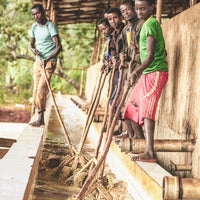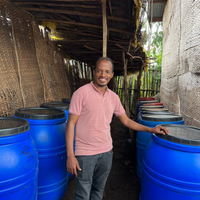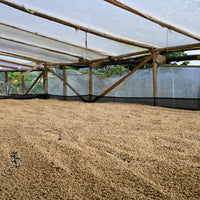El Salvador El Limo
Origin: El Salvador
Region: Apaneca-Ilamatepec
Altitude: 1200 meters above sea level
Farm: Finca El Limo
Owner: Jose Enrique Gutierrez
Variety: Yellow Icatu
Process: Anaerobic Natural
Tasting Notes: Juicy and clean with notes of milk chocolate covered coffee cherries.
This Yellow Icatu Anaerobic Natural from Finca El Limo is the natural product of knowledge amassed over time. This knowledge – and the drive to innovate – has been passed down to 2nd generation coffee producer Jose Enrique Gutierrez, who applies it to producing high quality specialty lots like this one.
Second-generation coffee producer, Jose Enrique Gutierrez is dedicated to producing high quality coffees in a sustainable manner. His family produced coffee in the eastern region of El Salvador but left due to low coffee prices and civil war in the 1980s. Nevertheless, coffee is Jose’s passion and, when he purchased his first farm in 2007, he did so with a specialty mindset.
Jose mixes traditional agronomic knowledge with his own ideas for more sustainable practices. The specialty industry provided a stable price that, with his quality production, enabled him to increase his land and purchase additional farms. Today, all of his farms, San Jose, El Limo, Las Brisas, El Horno and Los Cocos are focused on specialty production.
As he purchased each new farm, Jose renovated the farms and installed integrated farming systems that focused on sustainable, high quality production.
Finca El Limo, sits 1,200 meters above sea level in the Apaneca-Ilamatepec mountain range.
Cherry is handpicked at peak ripeness and delivered to the on-farm wet mill. At intake, workers visually handsort cherry to remove any damaged, underripe or overripe cherry. Cherry is placed in airtight bags and sealed to ferment for 68 to 72 hours. Bags are kept under shade to control fermentation.
Following fermentation, cherry is transported to the El Carmen mill in Ataco to sundry on raised beds. Workers at the mill turn cherry to frequently to ensure even drying. It takes approximately 30 to 32 days for cherry to dry.
Don’t be fooled by El Salvador’s small size. It was once the 4th largest coffee producer worldwide and continues to produce high quality lots. The country is known for its great cupping varieties, such as Bourbon and Pacamara. In fact, two beloved, frequently high-scoring varieties—Pacas and Pacamara— originated in El Salvador.
Unlike other countries, where specialty coffee production has required a great deal of additional investment and training, El Salvador already has a broad and skilled specialty coffee workforce. Farming traditions run deep, and many Salvadorian farmers are extremely passionate about coffee production and continuously strive to improve their crop. El Salvador has optimal conditions for coffee processing. The prolonged dry season typically occurs during the harvest season, making it easier to sun dry coffee.
Though coffee output in the country has been declining for over two decades, exacerbated by the Coffee Leaf Rust crisis, the approach to coffee production has changed from volume- to quality-driven. A new generation of coffee producers has sprouted around the country with a new vision and approach to production. Many of this generation are experimenting with processing and varietals.







